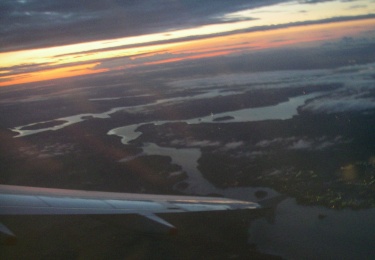I was sent to Sweden last week to give a training course in GH Tester . This was very stressful for various reasons, and hard work. I spent the whole three days in a hotel/conference centre just outside Arlanda airport near Stockholm, which seems like a terrible wasted opportunity to go see Stockholm or do something more interesting, but in between working and stressing there was no time.
I think the training course went well though, which is quite satisfying to look back on. Other good things about the trip…
There was a funny guy from Finland on the course. We got chatting about how he goes on big moose hunting expeditions. Apparently as a young Finnish hunter he partook of the tradition to drink a cup of blood from the first beast he killed. Warm and quite salty he told us. He also talked a lot about saunas. Apparently in Finland there is ludicrous ratio of saunas to people. One for every family. And when farmers settled into a new area of the wilderness, they would build a sauna first, and then the farmhouse.
I got to fly BA from the new Heathrow terminal 5. I didn’t approve of Heathrow expansion, but they’ve done it now, so might as well enjoying being in a nice modern airport. I also enjoyed BA’s headrests on the way out, but not on the way back (Headrest designers please design them so that you can rest your head to sleep. It’s not rocket science)
And this view over Sweden on the way home was nice.

I was looking at the swirly arrangement of these lakes on the Stockholm map So here’s a challenge for you: See if you can work out exactly which lakes on the map we can see in this photo. I couldn’t.
UPDATE: There’s quite distinctive little island in view in the photo, which wasn’t rendering properly before on the map. Having fixed this, it’s clear that the view is looking North Northwest with plane being about here.
 Andreas Rindler’s
Andreas Rindler’s